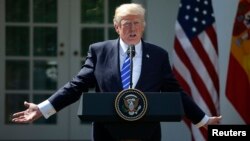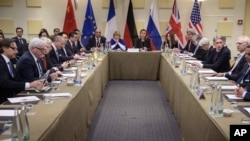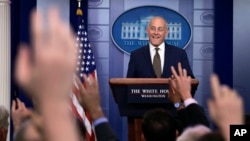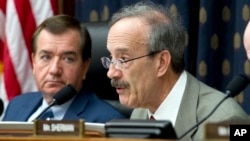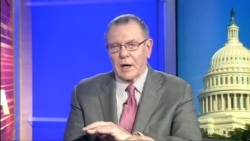U.S. President Donald Trump, following impassioned appeals from some of America’s closest allies and members of his own administration, is likely to stop short Friday of calling for the abandonment of a 2-year-old nuclear deal with Iran while unveiling a more confrontational overall strategy towards Tehran.
The White House, early Friday, announced that the president, in consultation with his national security team, “has approved a new strategy for Iran.”
Lawmakers say that while Trump will no longer certify what is known as the Joint Comprehensive Plan of Action (JCPOA), he will not urge Congress to reapply sanctions on Iran.
“He’s signaling his intense dislike for the deal, but taking no concrete steps to undermine it or to leave it,” Democrat Sen. Chris Coons, a member of the Foreign Relations Committee, told MSNBC.
Against it from the beginning
Trump has strongly opposed the deal since it was approved in 2015 with Iran by the five permanent members of the United Nations Security Council and the European Union.
While accusing Iran of seeking to exploit loopholes in the deal and refusing to allow the United Nations’ atomic watchdog to inspect nuclear facilities on military sites, behavior the White House says “cannot be tolerated,” the Trump administration is now calling for the deal to “be strictly enforced.”
The Trump Iran policy instead focuses “on neutralizing the government of Iran’s destabilizing influence and constraining its aggression, particularly its support for terrorism and militants.”
White House officials said the goal will be to “deny the Iranian regime all paths to a nuclear weapon.”
If the president, as expected, announces he will no longer certify Iran’s compliance with the nuclear agreement, Congress will have 60 days to decide whether to re-impose U.S. sanctions on Tehran.
Trump is “deep in thought, to say the least, about a way ahead in Iran,” White House Chief of Staff John Kelly told reporters Thursday. “He’s not the only one that thinks that maybe the deal that was struck under the previous administration is a deal that, in the long term, even in the medium and long term, will not protect America.”
“Iran is now a powerful nation state that remains the world’s largest state sponsor of terror,” CIA Director George Pompeo said Thursday, adding that its intelligence and security ministry in the Islamic Revolutionary Guard Corps “are the cudgels of a despotic theocracy,” Kelly said.
Iran’s Foreign Minister, Mohammad Javad Zarif, pledged Wednesday a “tougher” response if Trump finds Tehran not in compliance with the deal. An Iranian military spokesman further promised that his country’s forces would teach the U.S. “new lessons” if needed.
Concern at home, abroad
Word that the president would likely not certify the deal prompted an outpouring of concern earlier this week, both at home and abroad.
British Prime Minister Theresa May phoned Trump on Tuesday to urge him to think carefully about the consequences, calling the agreement “vital for regional security.” British Foreign Secretary Boris Johnson called his counterpart Secretary of State Rex Tillerson to argue that the deal was “making the world a safer place.”
At a meeting of the House Foreign Affairs Committee Wednesday, the ranking Democrat, Rep. Elliott Engel, said he had originally opposed the JCPOA, when it was agreed to by the Obama administration. But he said he is now opposed to backing away from it.
“As the administration seems poised to take the first step from the JCPOA, I must say I view that course as a grave mistake,” Engel said. “Unless we see solid evidence that Iran is cheating, the United States has to live up to our word.”
Later, when questioned by a Republican committee member, Dana Rohrabacher, about whether they thought Iran is complying with the agreement, three of four witnesses testifying replied in the negative.
With few signs Iran is willing to modify its behavior, some say the U.S. must take a more aggressive approach to weaken Iran’s widening influence.
"The Iranians are concerned about this [decertification],” Michael Pregent, a former U.S. intelligence officer now with the Hudson Institute, told VOA's Jeff Seldin. “It calls them out for their behavior. It punishes them for their behavior.”
In a conversation with VOA’s Jela de Franceschi, retired General Jack Keane, a supporter of decertifying the Iran nuclear agreement, argued in favor of the expected move by President Trump:
What it required
The accord required Tehran to sharply restrict its nuclear program and allow more access to international inspectors. Iranian leaders also promised not to seek, develop or acquire nuclear weapons. In return, Iran received relief from crippling economic sanctions, including the release of billions of dollars in frozen overseas assets and re-admittance to the international banking system.
The Iran Project, a group led by several former U.S. diplomats backing the accord, says not recertifying “would have grave long-term political and security consequences for the U.S. — including another regional war.”
The group’s statement argues “no American national security objective would be served by scuttling the nuclear agreement as long as Iran remains in compliance and without a nuclear weapon.
But current and former U.S. intelligence and military officials say any Iranian action is unlikely to be carried out directly and that such behavior would not be a dramatic departure from Iran’s behavior since the JCPOA went into effect.
Peter Heinlein, Jeff Seldin contributed to this report.




